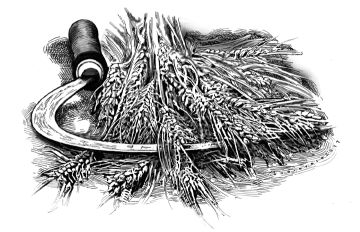
On my cell phone, I found the file I was looking for and went ahead to print it. Quickly, I set up the wireless printer and in no time, it was sending out copies into the tray. Upon checking, I saw that the letters were of much bigger font size than usual, which was surprising because I did not change the default setting, and which meant that I would be using many more bond sheets than expected. Still, inasmuch as the machine had churned out many pages of the file, I just let it continue. Anyway, no matter the size of the font, I would still be able to read the document and get what I wanted.
How often have I experienced this, having my work spoiled by something unwanted. Within minutes after a thorough washing, the car might bear on its roof and glass the dull white droppings of inconsiderate birds. At one time, I just let the doo-doo stay, knowing that the birds would come back anyway. Besides, the heavy clouds were hanging, ready to let the rain do the cleaning up.
Perhaps what I did was a sort of surrender. Does it mean that, because the weeds would invade anyway, we will not harrow the fields?
I remember the Parable of the Wheat and the Tares. In his Gospel, Matthew writes: “The kingdom of heaven may be likened to a man who sowed good seed in his field. While everyone was asleep, his enemy came and sowed weeds all through the wheat, and then went off. When the crop grew and bore fruit, the weeds appeared as well. The slaves of the householder came to him and said, ‘Master, did you not sow good seed in your field? Where have the weeds come from?’
He answered, ‘An enemy has done this.’ His slaves said to him, ‘Do you want us to go and pull them up?’ He replied, ‘No, if you pull up the weeds you might uproot the wheat along with them. Let them grow together until harvest; then at harvest time, I will say to the harvesters, ‘First collect the weeds and tie them in bundles for burning; but gather the wheat into my barn.’”
Jesus explained the parable in this way, “He who sows good seed is the Son of Man, the field is the world, the good seed the children of the kingdom. The weeds are the children of the evil one, and the enemy who sows them is the devil. The harvest is the end of the age, and the harvesters are angels.
Just as weeds are collected and burned [up] with fire, so will it be at the end of the age. The Son of Man will send his angels, and they will collect out of his kingdom all who cause others to sin and all evildoers. They will throw them into the fiery furnace, where there will be wailing and grinding of teeth. Then the righteous will shine like the sun in the kingdom of their Father.”
The 16th century Dutch painter Abraham Bloemaert depicted the parable in a painting, entitled, “Parable of the Wheat and the Tares.” The painting shows four people sleeping, two of them — a man and a woman — completely naked, an allusion to Adam and Eve, to the fact that because of their sin, humankind tends towards Sloth, here suggested by sleep, and by a dovecote, which attracts pigeons and allows their use as food without the need of breeding them. A goat nearby hints at lust. All the while, the devil sows weeds in a field.
St. Augustine said that in each of us are found both wheat and weeds. Their presence manifests itself at most every moment, even in the simplest of tasks. When I cleaned the car, I was wheat. And I was weeds when I threw up my hands and just waited for the rain to wash the bird waste off the glass. My words, no matter their font size, can be weeds or wheat, depending on whether or not they harmonize with the Word.

